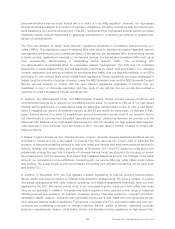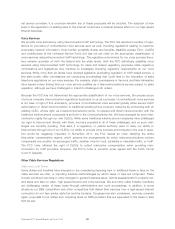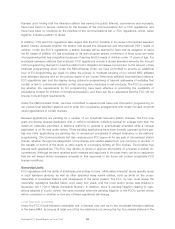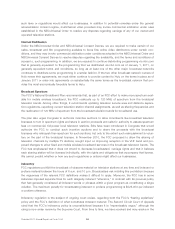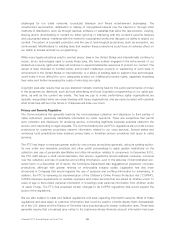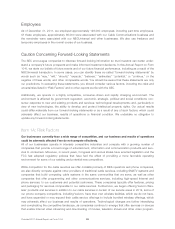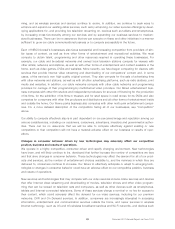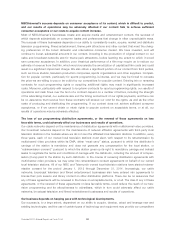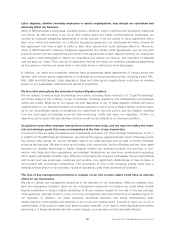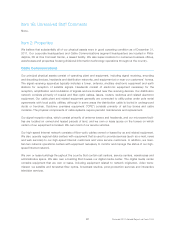Comcast 2011 Annual Report Download - page 29
Download and view the complete annual report
Please find page 29 of the 2011 Comcast annual report below. You can navigate through the pages in the report by either clicking on the pages listed below, or by using the keyword search tool below to find specific information within the annual report.disclosed because of a security breach. In addition, the FTC is applying the “red flag rules,” which are
designed to detect the warning signs of identity theft, in the Fair and Accurate Credit Transactions Act of
2003 to both financial institutions and creditors; we have established a compliance program as required
under these rules.
We are also subject to state and federal “do not call” laws regarding telemarketing and state and federal laws
regarding unsolicited commercial e-mails. Additional and more restrictive requirements may be imposed if
and to the extent that state or local authorities establish their own privacy or security standards or if Con-
gress enacts new privacy or security legislation.
Advertising Restrictions
Legislation has been introduced and reports from various government agencies have been issued from time
to time urging that restrictions be placed on advertisements for particular products or services, including
prescription drugs and the marketing of food or violent entertainment to children. We are unable to predict
whether such reports will result in legislative proposals, whether legislative proposals may be adopted, or, if
adopted, what impact they will have on our businesses.
Environmental Matters
Certain of our business operations are subject to environmental laws and regulations and involve air emis-
sions, wastewater discharges, and the use, disposal and cleanup of toxic and hazardous substances. Any
failure to comply with environmental requirements could result in monetary fines, civil or criminal sanctions,
third-party claims or other costs or liabilities. We have been responsible for the cleanup of environmental
contamination at some of NBCUniversal’s current and former facilities and at off-site waste disposal loca-
tions, although our share of the cost of such cleanups to date has not been material. Environmental
requirements have become more stringent over time, and pending or proposed new regulations could impact
our operations or costs. For example, climate change regulation, such as proposed greenhouse gas emis-
sions limits or cap and trade programs, could result in an increase in the cost of electricity, which is a
significant component of our operational costs at some locations. We are unable to accurately predict how
these requirements might be changed in the future and how any such changes might affect our businesses.
Disabilities Access
Our businesses are subject to a number of requirements related to ensuring that our services are accessible
to individuals with hearing and vision impairments. Among other things, our voice services and email services
must be accessible to persons with disabilities; we must provide additional narrations of key visual elements
(referred to as “video description”) on certain of our video services and programming; and we must include
closed captioning on certain video programming delivered to our customers.
Other FCC Regulations
The FCC actively regulates other aspects of our businesses, including the mandatory blackout of syndicated,
network and sports programming; customer service standards; loudness of commercial advertisements;
political advertising; Emergency Alert System requirements; equal employment opportunity; lottery program-
ming; recordkeeping and public file access requirements; telemarketing; technical standards relating to
operation of the cable systems and television stations; and regulatory fees. We are unable to predict how
these regulations might be changed in the future and how any such changes might affect our businesses. In
addition, while we believe that we are in substantial compliance with FCC regulations, we are occasionally
subject to enforcement actions at the FCC, which can result in our having to pay fines to the agency or being
subject to other sanctions.
27 Comcast 2011 Annual Report on Form 10-K




